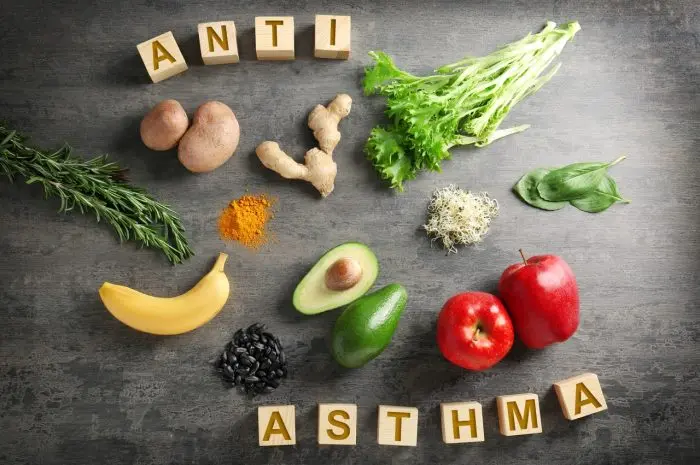Asthma, a chronic respiratory condition, affects millions of people worldwide, with symptoms ranging from mild wheezing to severe breathlessness.
While medication and proper management play crucial roles in controlling asthma, dietary choices can also influence symptoms and overall well-being.
Certain foods may either exacerbate or alleviate asthma symptoms, making dietary adjustments a valuable complement to traditional treatments.
In this article, we delve into the intricacies of food recommendations for asthma sufferers, exploring the science behind dietary choices and offering practical tips for a nourishing diet.
Understanding Asthma and Inflammation
Asthma is characterized by inflammation and constriction of the airways, leading to symptoms like coughing, wheezing, shortness of breath, and chest tightness.
This inflammatory response can be triggered by various factors, including allergens, irritants, respiratory infections, and exercise.
Inflammation lies at the core of asthma pathophysiology, and certain dietary components can either promote or mitigate inflammation in the body.
For asthma sufferers, the goal is to consume foods that help reduce inflammation and support respiratory health while avoiding those that may trigger or worsen symptoms.
Key Nutrients for Asthma Management
Omega-3 Fatty Acids
Omega-3 fatty acids, found abundantly in fatty fish like salmon, mackerel, and sardines, possess potent anti-inflammatory properties. Incorporating these fish into your diet may help reduce airway inflammation and improve lung function in asthma patients.
For those who don’t consume fish, sources like flaxseeds, chia seeds, and walnuts are excellent plant-based alternatives rich in alpha-linolenic acid (ALA), a type of omega-3 fatty acid.
Antioxidants
Antioxidants play a crucial role in combating oxidative stress, which is implicated in asthma severity.
Foods rich in antioxidants, such as fruits (berries, citrus fruits), vegetables (spinach, kale, broccoli), and nuts (almonds, hazelnuts), can help neutralize harmful free radicals and alleviate inflammation in the airways.
Vitamin D
Vitamin D deficiency has been linked to an increased risk of asthma exacerbations. While sunlight exposure is a primary source of vitamin D, dietary sources include fatty fish, fortified dairy products, and egg yolks.
Ensuring adequate vitamin D intake may help modulate immune responses and reduce asthma symptoms.
Magnesium
Magnesium plays a role in bronchodilation and airway smooth muscle function, making it essential for individuals with asthma.
Foods rich in magnesium include leafy greens, nuts, seeds, legumes, and whole grains. Incorporating these foods into your diet may help promote bronchial relaxation and improve asthma control.
Foods to Avoid or Limit
Sulfites
Sulfites, commonly used as preservatives in processed foods and beverages, can trigger asthma symptoms in sensitive individuals.
Avoiding processed meats, dried fruits, wine, and certain packaged foods can help minimize sulfite exposure and reduce the risk of asthma exacerbations.
Food Additives and Preservatives
Artificial additives and preservatives, such as monosodium glutamate (MSG) and artificial food coloring, may contribute to asthma symptoms in some individuals. Opting for whole, minimally processed foods and reading ingredient labels carefully can help avoid these potential triggers.
High-Sodium Foods
High-sodium diets have been associated with increased airway inflammation and asthma severity. Limiting intake of salty snacks, processed foods, and canned soups can help mitigate the adverse effects of sodium on asthma symptoms and overall respiratory health.
Dairy Products (for Some Individuals)
While dairy consumption doesn’t directly cause asthma, some individuals may experience worsened symptoms due to dairy-induced mucus production or lactose intolerance.
Experimenting with dairy alternatives like almond milk, soy milk, or lactose-free options may be beneficial for those sensitive to dairy products.
Practical Tips for Asthma-Friendly Eating
Emphasize Whole, Plant-Based Foods
Base your meals around nutrient-dense, whole foods like fruits, vegetables, whole grains, legumes, nuts, and seeds. These foods are rich in vitamins, minerals, antioxidants, and fiber, supporting overall health and asthma management.
Stay Hydrated
Adequate hydration is essential for maintaining optimal respiratory function and thinning mucus secretions. Aim to drink plenty of water throughout the day and include hydrating foods like soups, herbal teas, and water-rich fruits and vegetables in your diet.
Keep a Food Diary
Keeping track of your dietary intake and any associated asthma symptoms can help identify potential triggers and patterns.
Note down what you eat, when you experience symptoms, and any changes in asthma severity to pinpoint specific foods or food groups that may be problematic.
Work with a Registered Dietitian
Consulting with a registered dietitian who specializes in asthma management can provide personalized guidance and support. They can help tailor a nutrition plan to your individual needs, preferences, and dietary restrictions, optimizing asthma control and overall well-being.
Conclusion
While dietary modifications alone cannot cure asthma, they can play a significant role in managing symptoms, reducing inflammation, and improving overall respiratory health.
By incorporating asthma-friendly foods rich in omega-3 fatty acids, antioxidants, vitamin D, and magnesium while minimizing or avoiding potential triggers like sulfites and food additives, individuals with asthma can take proactive steps toward better symptom control and enhanced quality of life.
Remember to work collaboratively with healthcare professionals and registered dietitians to develop a well-rounded asthma management plan that addresses both medical and nutritional needs.
With mindful eating habits and informed dietary choices, asthma sufferers can embark on a journey toward optimal health and well-being.




